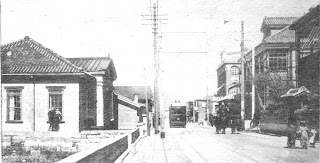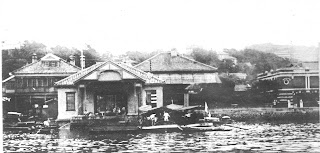 Nagasaki Customs and Oura-machi
Nagasaki Customs and Oura-machi 
Customs Hatoba, Nagasaki
The poor, over-worked Recording Angel, presumably, spent a busy couple of hours with his celestio-stylo pen, as filling up the line prefixed with the word "age" would materially increase his labours, judging from the number of ladies present.
There was also a less pleasant formality to be complied with, in accordance with the Sanitary Regulations of the port, of which, suffice it to be said earlier intimation might have been conveyed to the passengers.The Doctor announced that all passengers were expected to muster in the Dining Saloon, at the unholy hour of 5 a.m., the steamer being expected to arrive at the Quarantine Station and anchored by daylight.
So, at five in the morning, behold a most variegated assemblage in the saloon. Kimonos, dressing gowns and negligees of striking hues and startling patterns; one particular garment of green, yellow and blue, with a chaste design of lobsters, crabs and other crustaceans in their natural (unboiled) colours, being particularly conspicuous. It was further noted that, in many instances, lovely woman differs considerably in figure, charms and in the abundance of what the "Koko" people term "her crowning glory," in the extremes of p.m. and a.m. Another instance of the eternal conflict between Art and Nature presumably.
After the Doctor's inspection was concluded, the Police held their little seance. In single file, the passengers advanced to a table whereat were seated two polite Japanese officials. Suavely polite, m'yes, but extremely business-like and their enquiries were conducted with a celerity and efficiency which was remarkable. One of these gentlemen was in mufti while the other, a monolinguist, was in full uniform, wore a sword and from the careful manner in which he handled same at frequent intervals, it was presumed that it was loaded and that its wearer had some doubt as to its going off unexpectedly.
Passports were demanded, inspected and the bearer's rank, social status, intentions, birthmarks and idiosyncrasies elicited; all very politely, but with a gentle insistence which led one to conclude that it is easier for a Campbell to crawl through the eye of a gramophone needle than for the undesirable to enter Japan.
Noting what was in store when his turn arrived, the pilgrim borne down by thoughts of his lurid past, began to quake. The pilgrimage seemed doomed at its very outset as, apparently, permission to enter Japan was granted solely to the creme de la creme and while worrying over the possibilities in store for him as one of the rejected, his passport was gently taken from his hand and ere he actually realised it, he was on the 'grille' and had received permission to range himself among the sheep.
Hitherto no 'goats' had been discovered but at this juncture, one was led in, doing his best to look sheepish, his conductor having caught him flagrante delicto, photographing the harbour from the saloon deck!
This ardent devotee of the sunny Art, will it be believed? was none other than a Vice-Consul (another instance of the vagaries of the Official Mind). Despite the numerous notices prominently displayed about the steamer, not to mention the many cases which he must have read of in the newspapers, Mr. Vice-Consul had been amusing himself by seriously fracturing the War Department Regulations while the inquisition was in session in the saloon.
Possibly, it was a fortunate thing for him that he occupied an official position, otherwise it might have gone hard with him. As it was, beyond the confiscation of the reel of film and some admonitory advice, he got off scot-free.
A little later on in the day, the pilgrim found himself within an ace of fracturing the local Police Regulations. Happening to require some article packed in his dressing case, a thorough search (fortunately) was necessary to discover same. The search, however, brought to light his automatic, very necessary elsewhere but of little use in Japan, which had somehow got packed up with the rest of his gear.
On landing at the Customs hatoba the pistol was promptly declared and a merry little scene ensued, the finale being the conveyance of the artillery to the customs bonded store, there to rest, well vaselined, until regained by its owner on his departure from Japan.
In due time the pilgrim found himself installed as a 'supernumerary' at the home of Mama-in-law, situated in the Hunki-dori-machi.
Hunkidori, it may be observed, is merely a figure of speech as, for obvious reasons, no precise intimation of the locality will be given, beyond the statement that this funny little house, with its garden and its smiling and willing service; perched on the side of a hill, is about the coolest spot in Nagasaki.
The interior appears to consist, in the main, of primrose-coloured , paper screens and polished woodwork and the convenient electric light somehow, seems to be an anachronism.
From the verandah, a splendid view is obtained of the Harbour and that part of the town lying on the slopes below. The scenery seems to vary with time and season and during the evening, no student in the life class need go short of a model, either for the head or "the altogether," as 6 p.m. and bath-time synchronise hereabouts.
This results in many replicas of Messrs. Pears' advertising poster: "The Happy little Jappy in her tub." Yes; there is a Lady Godivaness about the p.m. scenery that is charming.

Tatami room

No comments:
Post a Comment